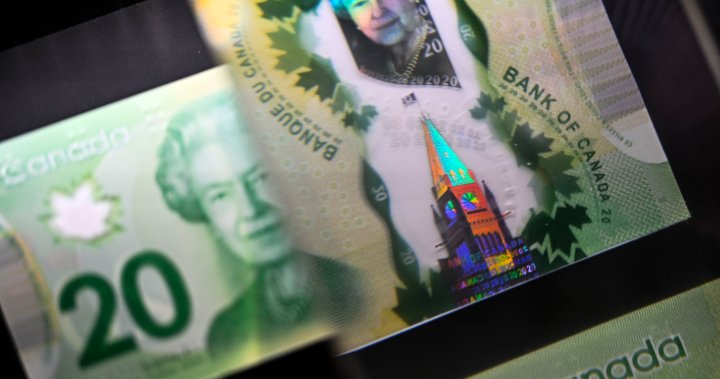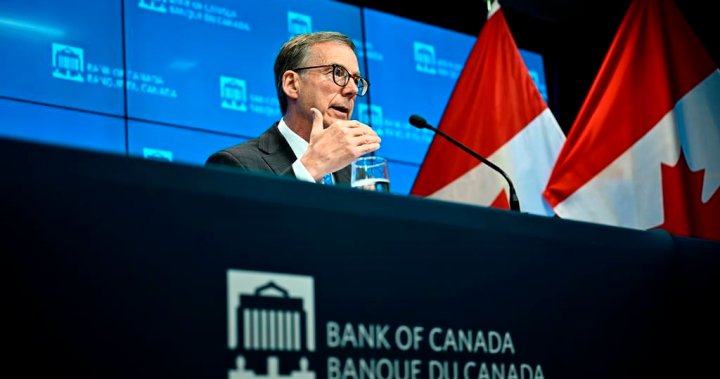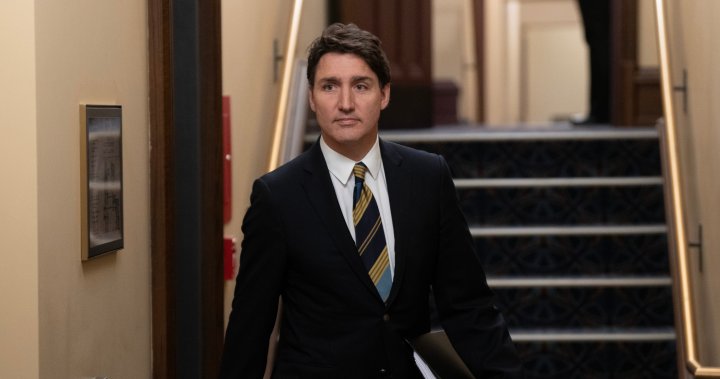Canadians preparing to head to the polls in the new year are likely to be voting with their wallets.
Cost-of-living issues continue to dominate the list of priorities for Canadians, according to the findings of new Ipsos polling conducted exclusively for Global News.
The results of the poll, published Friday, found that one in four respondents ranked inflation and the cost of living as their top priority in Canada today, up five percentage points from a year earlier.
While health care took the second spot (17 per cent, up three points from last year), other pocketbook issues dominated the rest of the list, according to Ipsos.
Housing availability and affordability (14 per cent) rounded out the top three, followed by immigration (seven per cent), and the economy, unemployment and jobs (also seven per cent). Taxes, poverty and social inequality and government debt all followed at five per cent.

The polling, conducted from Dec. 6 to 10, surveyed more than 1,000 Canadians aged 18 and older in an online forum.
While inflation has appeared largely well-behaved in 2024 and the Bank of Canada has rapidly lowered its benchmark interest rate since mid-year, that relief came after years of rapid hikes in the cost of living.
“The scars of inflation are still there,” Sean Simpson, senior vice-president at Ipsos Global Affairs, tells Global News.
“If people couldn’t afford their groceries last year, what leads us to believe that they are better able to afford them this year? The answer is they cannot. And so that continues to be the number one issue in Canada.”
Young Canadians are particularly feeling the pinch heading into 2025, Simpson notes. The youngest generations are the most likely to lack a pension, struggle to find a job or be unable to break into the housing market, he points out.
Affordability anxiety is particularly acute in Canada compared with peer countries, Simpson says, with Canadians among the top five globally for their concerns around affordability for the second year in a row.
It’s particularly telling that affordability knocks health care to the second spot, he adds. In more typical years, health-care issues tend to rank at the top just because there’s a sense things can always be better when it comes to emergency room wait times or quality of care.

Get weekly money news
Get expert insights, Q&A on markets, housing, inflation, and personal finance information delivered to you every Saturday.
“When it drops to number two, that means that there’s something else going on. And clearly that’s something else is cost of living,” Simpson says.
Simpson also finds it “remarkable” that immigration has surged to the No. 4 issue for Canadians, reflecting concerns about how rapid population growth has inflamed housing affordability problems in recent years.

Poilievre seen as top leader to address cost of living
The latest polling comes at the end of a turbulent 2024 for Prime Minister Justin Trudeau and the Liberal Party. Chrystia Freeland’s departure as finance minister left the Liberals scrambling in the waning days of the year, and NDP Leader Jagmeet Singh signalled that he would vote non-confidence in the Trudeau government, potentially toppling the minority government.
With a federal election set for next year and questions about whether it could arrive as early as this spring, the Ipsos polling also sheds light on who Canadians trust most to handle their cost-of-living concerns.
When asked about which political leader would be best equipped to handle inflation and the cost of living, Conservative Leader Pierre Poilievre rose to the top of the pack. The leader of the official Opposition was also pegged as best to handle housing, the economy, taxes and immigration policy.
The NDP’s Singh was seen as the ideal steward for health care as well as poverty and social inequality concerns, while Green Party Leader Elizabeth May topped voters’ picks to address climate change.
Trudeau and Bloc Québécois Leader Yves-François Blanchet ranked as top choices to address none of voters’ priority concerns.
“The Liberals are obviously less popular, but it’s more than that. The economic sentiment is lower, financial health is lower. Anxieties about the future are higher,” Simpson says.

While the Conservatives might be viewed as the No. 1 pick for many Canadians in 2025, Simpson says there is room for the NDP to take second place if the Liberals continue to fall out of favour. He notes, however, that federal elections rarely hinge on issues such as health care, where the NDP appears to hold the most political authority.
Simpson says this poll suggests Canadians feel that Trudeau has largely focused on the wrong issues in recent years. Concerns around climate change, which were a central theme in the 2019 federal election, for instance, have fallen largely out of the minds of voters as more immediate “kitchen table” issues surge to the forefront, he says.
“If you’re struggling to put food on the table, if you’re struggling to put a roof over your head and the head of your children, climate change is just simply going to fall down the list,” Simpson says.
Poilievre has branded the upcoming election as a question over the Liberals’ carbon pricing plan, and Simpson notes that, to Conservatives, cutting taxes is seen as a direct approach to the affordability issue.
Recent measures like the two-month GST/HST holiday have yet to stem the Liberals’ bleeding support in the polls, he adds, as such moves are viewed more as temporary relief than a prolonged, “sustainable” approach to affordability concerns.
“Canadians are very much focused on pocketbook issues going forward. And they will reward the parties who they see as having solutions to those pocketbook issues in 2025,” Simpson says.
These are some of the findings of an Ipsos poll conducted between Dec. 6 and 10, 2024, on behalf of Global News. For this survey, a sample of 1,001 Canadians aged 18+ was interviewed online. Quotas and weighting were employed to ensure that the sample’s composition reflects that of the Canadian population according to census parameters. The precision of Ipsos online polls is measured using a credibility interval. In this case, the poll is accurate to within ± 3.8 percentage points, 19 times out of 20, had all Canadians aged 18+ been polled. The credibility interval will be wider among subsets of the population. All sample surveys and polls may be subject to other sources of error, including, but not limited to coverage error, and measurement error.
—with files from Global News’ Anne Gaviola






